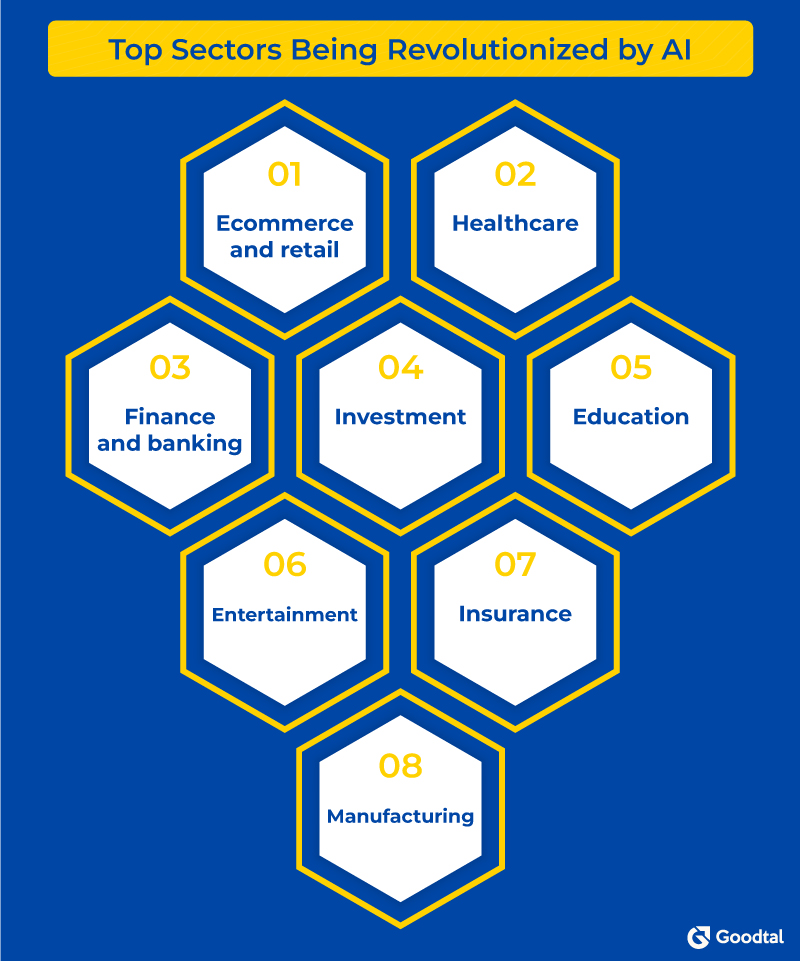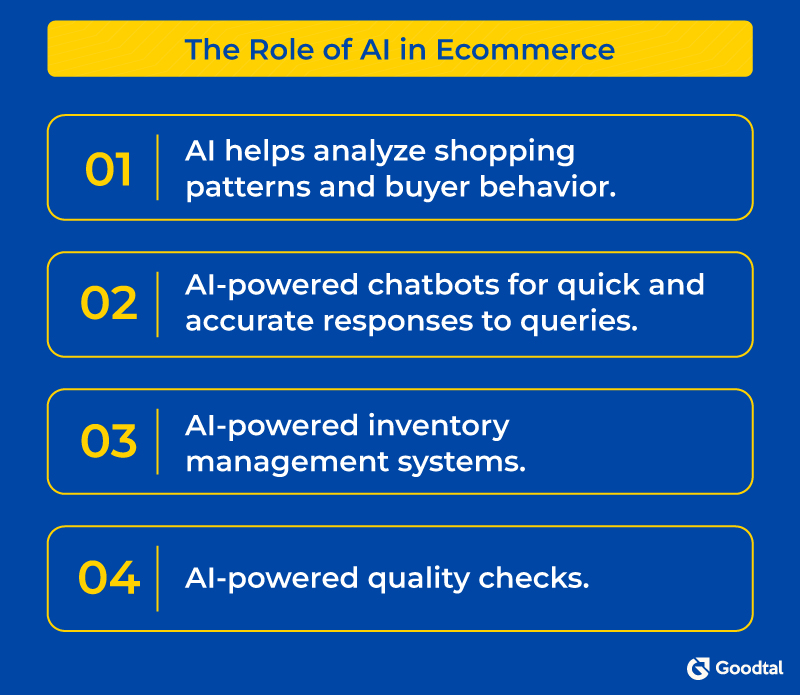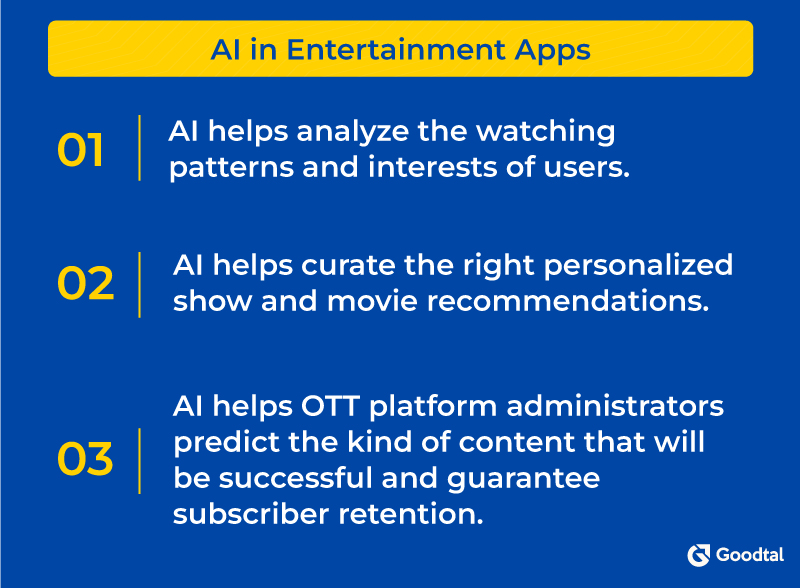
"In our business, we talk about emerging technologies and how they impact society. We've never seen a technology move as fast as AI has to impact society and technology. This is by far the fastest-moving technology that we've ever tracked in terms of its impact, and we're just getting started."
- Paul Daugherty, chief technology and innovation officer, Accenture
Paul is right; the pace with which AI technology has emerged and gained traction, especially in the 21st century, is marvelous. There were days when AI technology was just known to techies and scientists, with the use limited to labs. But today, AI is present almost everywhere; the technology controls many aspects of our lives that most of us are unaware of.
In this post, we will discuss one such field where finding AI these days is most common: mobile apps.
There seems to be a race for AI adoption in mobile app development with the same goal of creating excellent applications with unique concepts, features, and operations like never before. Android developers are quickly adopting AI and ML to leverage their benefits and provide the best user experience.
We will learn more about how Android developers are using AI to create innovative mobile applications. Let's begin by briefly overviewing AI and its implementation in various sectors.
A Brief Overview of AI
Artificial intelligence today is a huge market with a value of anticipated to reach over 100 billion USD by the end of 2023. This market is projected to flourish and grow over 20 times and reach about 2 trillion USD by 2030. The reason behind the anticipated 2 trillion dollar growth is the increasing adoption of AI technology in almost every sector functioning today.
AI is everywhere, from the application of AI in agriculture for finding soil deficiencies and planting suggestions to its application in Ecommerce industries for better inventory management and many such operations. Whether for internet-run devices, computerized equipment, or for monitoring environmental and agricultural activities, AI is helping in every possible field.
One of the most life-changing applications of AI is in the healthcare industry, where it is being increasingly used to predict diseases in advance and, more importantly, suggest the best treatments. Military, Education, Finance, Marketing, and Social Media are other vital areas where AI does transformative work.

The application and outreach of artificial intelligence are not just limited to the mentioned ones, but its scope spans a much higher range of applications.
Suggested Reading: Remarkable Ways AI and Blockchain Are Transforming the Future
How Can Android App Developers Use AI and ML?
Google is running at the forefront when it comes to the race to adopt Artificial Intelligence. Google is the creator of the Android operating system; hence, Android is leaving no stone unturned when it comes to harnessing the power of artificial intelligence.
Android is providing Android app developers with a range of ML SDKs, allowing them to leverage AI in their apps and develop excellent and competent mobile apps with low latency and minimal cost. Android provides app developers with both readymade ML SDKs and custom ML stack. These ready-to-use ML models do not require AI and ML expertise and can be used by everyone.
Some essential readymade ML API kits available on Android are Face Detection, Barcode scanning, Text recognition, smart reply translation, image labeling, and many more.
Today, artificial intelligence has become a critical ingredient that can be found in almost every leading mobile app, such as the highly popular chatbot ChatGPT. AI has become a prevalent choice in gaming apps like "The Last of Us" and "Halo: Combat Evolved."
Type of Android Apps That Can Be Developed Using AI & ML
Android app developers can leverage AI & ML to create various apps, from healthcare to educational and fintech apps. Let's discuss some types of mobile apps that can be built with AI & ML integration to boost their effectiveness threefold.
#1 Ecommerce Apps
Ecommerce is one of the first sectors to leverage AI to improve the customer experience and boost personalization. AI in the ecommerce market is anticipated to reach USD 16.8 billion by 2030, thus registering a growth of 15.7% CAGR in the next eight years.
All the leading ecommerce apps, like Amazon, Walmart, eBay, and many more, use artificial intelligence to provide a more personalized shopping experience. Amazon is leveraging AI in its app in numerous ways, starting from its use for learning customer behavior to provide customized shopping experiences to the availability of AI-powered chatbots that solve customer queries quickly and efficiently.
Companies like Amazon use AI in their inventory management to flag off defective products more efficiently than manual handling in order to provide the best quality products to their customers.

#2 Healthcare
AI in healthcare is a vast market, with the market value standing at around USD 20.65 billion in 2030 and anticipated to rise to USD 187.95 billion by 2030. With this, the rise in Android app development for healthcare is booming as Android developers gear up to use Android capabilities and AI integration to make unique and outstanding apps.
One of the prime examples of an AI-powered app is Noom. This weight loss app is directed by artificial intelligence and uses principles of psychology to push your mind to become more devoted to the weight loss journey. Another effective healthcare app is Healthily, which uses AI's cognitive powers to help users with personalized health suggestions, vitals monitoring, and much more.
#3 Fintech
Fintech is among the most prominent sectors and a frontrunner amongst AI adopters. With the integration of AI, this sector has been able to tighten cybersecurity and protect users from cyber theft and client data from falling into the wrong hands.
Almost all the leading banks are integrating AI into their banking apps to make them more secure for their customers and the bank and provide a more personalized banking experience.
#4 Educational Apps
Educational apps are another significant contender and among the frontrunners in the race for AI adoption. Artificial intelligence is used heavily in curating curricula, intelligent tutoring systems, content recommendations, language learning, grading assignments and exams, and much more.
One of the best examples of educational apps leveraging artificial intelligence is Duolingo. Duolingo is the most loved language learning app, with over a billion downloads. Duolingo uses AI to learn about the learning trends and behavior of the app users to learn their strengths and weaknesses and curate the best content for them, thus boosting their overall learning experience.
#5 Entertainment apps
Entertainment companies are heavily investing in AI and leveraging its powers in their mobile apps to provide better content suggestions to boost their viewership and ensure that customers stick to their platforms for a longer time.
Netflix is one of the best examples of AI in entertainment apps. The OTT giant is using the technology to read and monitor its subscriber's habits and likes and dislikes to suggest more accurate shows and movies that users might find interesting.

Netflix is also using AI and ML to analyze what content can bring more success to the platform, helping it invest in the right Netflix original shows and movies and curate a better catalog.
#6 Investment Apps
All the leading investment apps are using artificial intelligence today to predict market outcomes and make better investment suggestions for their customers to build their credibility and market reach.
Investment apps leverage AI to analyze market trends, predict future market conditions and outcomes, research the market position of every listed company, and provide investment suggestions to the public, ensuring that the investors earn the most profit. Meanwhile, it also alerts the investors about the position of listed companies about the go-in loss and provides them with the best advice.
Wealthfront, Alphainvest AI, Robowealth, Acorn, WealthBuddy, and many more are leading investment apps using Artificial Intelligence.
Suggested Reading: Is Generative AI All Set to Rule Web Development?
Wrapping Up
Artificial intelligence is one of the most transformative technologies of this decade. AI and ML are creating wonders and revolutionizing everything: how we live, do our daily chores, interact with people, and much more. In this post, we discussed how AI is helping Android app developers create more robust and innovative mobile apps.
The creators of the Android operating systems are integrating AI and ML at a larger scale, thus allowing Android app developers to create more mind-blowing apps. AI and ML have allowed mobile app developers to leverage these technologies to create excellent apps that help people do their regular tasks more quickly, efficiently, and fun.
In this era, businesses must invest in AI and reap its benefits while the trend lasts and stands on par with their competitors.
